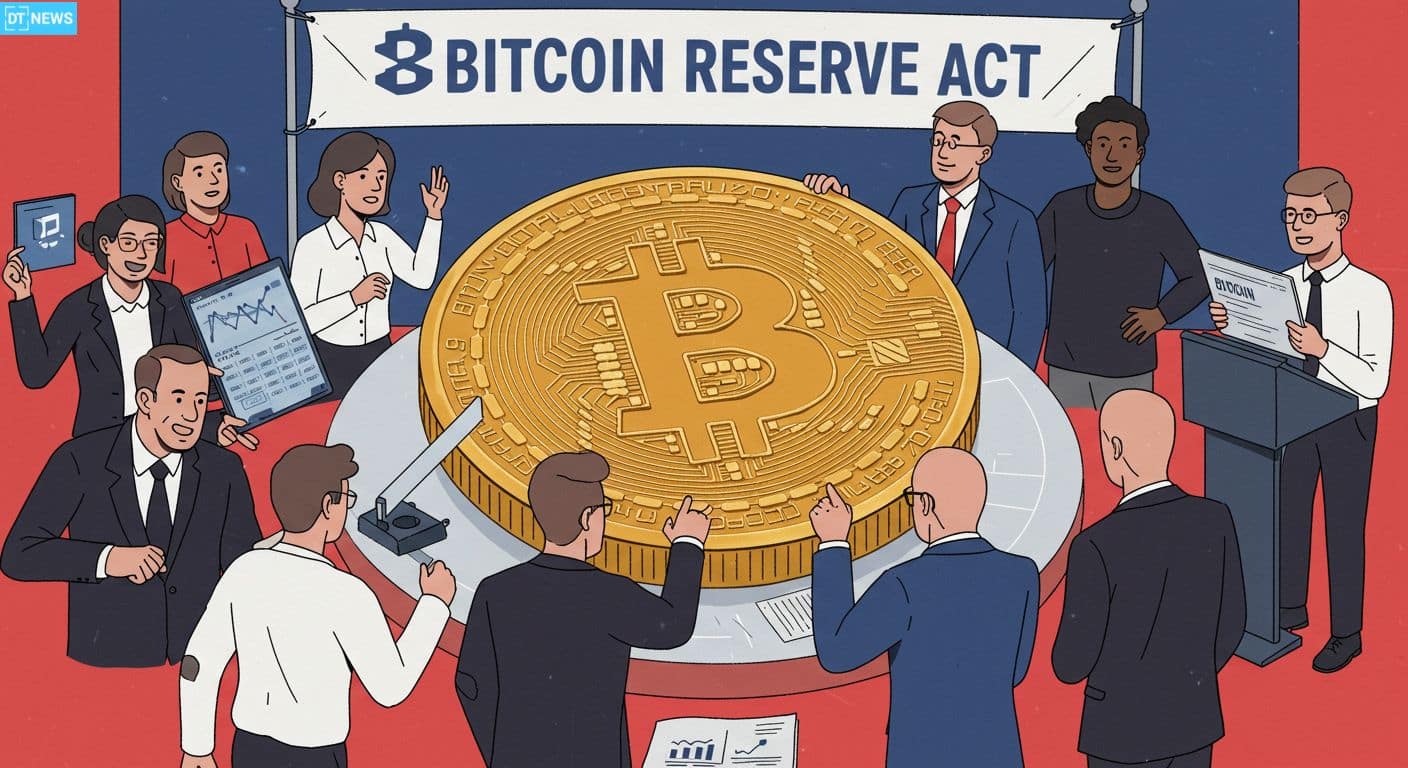According to latest reports, after the GENIUS Act and more pro-crypto legislation, US lawmakers are now taking concrete steps to move the Bitcoin strategic reserve proposal forward. Under the BITCOIN Act, introduced in 2025 by Senator Cynthia Lummis, the US would buy one million Bitcoin (about $115 billion) over 5 years in a budget-neutral way.
Industry leaders like Michael Saylor and Tom Lee are meeting with Congress this week to discuss funding and politics.
What’s New: Roundtable and Legislative Status
Following the big news, US lawmakers are meeting with 18 crypto executives, including Michael Saylor of Strategy and Tom Lee of Fundstrat / BitMine, to move the BITCOIN Act forward. The meeting is organized by crypto advocacy groups- The Digital Chambers and Digital Power Network.
They will focus on making sure the acquisition is budget neutral and identify what has stalled the bill for the past months. Funding options being discussed include reevaluating how gold certificates are used and harnessing surplus tariff revenue.
The BITCOIN Act (Senate Bill S.954, 119th Congress) was introduced on March 11, 2025; by Senator Lummis. It has been referred to the Senate Banking, Housing; and Urban Affairs Committee but has not yet passed out of committee.

Also read: Treasury Under Pressure: Will the US Bitcoin Reserve Become Reality?
Relationship with GENIUS Act and Regulatory Push
The momentum for the Bitcoin strategic reserve proposal builds on recent legislative wins. The GENIUS Act was signed into law in July 2025 and provided a regulatory framework for stablecoins, including reserve, disclosure and compliance requirements.
The Clarity Act passed the House and is now in the Senate. It aims to clarify whether certain digital assets are securities or commodities.
These bills help create a good backdrop for the BITCOIN Act because better legal definitions and oversight reduce some of the risks that have previously discouraged governments and institutional actors from holding large crypto reserves.
Notable Players and the Roundtable’s Goals
The roundtable includes industry executives like Michael Saylor and Tom Lee, mining company CEOs like Fred Thiel of MARA, venture capital firms and banking representatives like Western Alliance Bank.
The roundtable aims to find budget-neutral funding options, such as tariff surplus, gold certificate revenue. Identify what has stalled the BITCOIN Act (politics, law, institutions); Build support among lawmakers.
Potential Challenges and Uncertainties
There are several risk points that could slow or stop progress. First, the funding mechanism must be approved by Congress; reusing gold reserves or exploiting tariffs may be met with resistance.
Second; Bitcoin’s price volatility is a risk for managers if a large reserve is held. Third, the legislative timeline is tight: the BITCOIN Act has not made it out of committee and similar market-structure legislation is being negotiated in the Senate.
Also, public perception and geopolitical risk are factors. Some lawmakers and watchdogs question whether a large cryptocurrency reserve is in the public’s interest, especially if market crashes happen.
Finally, oversight, custody and security of large amounts of Bitcoin will require strong legal and technical frameworks.
Also read: U.S. to Grow Bitcoin Reserves Using Seized Assets, Treasury Secretary Confirms

Implications If Passed
If passed, the US acquiring 1 million BTC over 5 years via the BITCOIN Act would make the government a very visible sovereign holder of Bitcoin. It would change how Bitcoin is viewed in national asset management. The budget neutrality requirement may encourage creative fiscal policy.
Also, institutional interest in Bitcoin would increase as custodians, banks, and ETF providers may accelerate investing, custody, and infrastructure readiness.
But unless political consensus is reached and unless the funding mechanisms and custody frameworks are solidly built, the proposal may be symbolic rather than transformational.
Conclusion
Based on the latest research, recent events suggest the Bitcoin strategic reserve proposal is getting real. Lawmakers are talking to industry voices, working on detailed funding mechanisms and leveraging regulatory wins to build a foundation.
While there are many hurdles from legislative approval to risk management, the BITCOIN Act is moving from just an idea to becoming a reality. The next rounds of Congress and executive planning will show if this becomes law or stays a proposal.
For in-depth analysis and the latest trends in the crypto space, our platform offers expert content regularly.
Summary
The U.S. BITCOIN Act, introduced in March by Senator Cynthia Lummis, would have the government buy 1 million BTC over 5 years in a budget neutral way. This week, Congress is meeting with industry leaders like Michael Saylor and Tom Lee at a roundtable hosted by The Digital Chambers to work out practical funding mechanisms.
Glossary
Strategic Reserve – A government policy to hold a commodity or asset to buffer national value and strategy.
Budget-Neutral – A fiscal policy that avoids increasing debt or using new taxes by reallocating existing government resources.
Gold Certificates – Securities that represent ownership of physical gold, sometimes used historically as collateral or reserves.
Tariff Revenue – Funds collected from taxes imposed on imported goods, which may be repurposed under legislative proposals.
Market-Structure Legislation — Laws defining how crypto assets will be regulated, how exchanges/brokers are treated, and how assets are classified
FAQs on US Bitcoin Strategic Reserve Bill
What is the BITCOIN Act?
A bill introduced in March 2025 by Senator Cynthia Lummis to have the US buy one million Bitcoin over five years budget neutral.
Who are those involved in pushing this forward?
Industry leaders like Michael Saylor, Tom Lee, mining firms like MARA and banks are meeting with lawmakers as part of the advocacy and planning process.
How will it be funded without adding costs?
Options being discussed are using tariff surplus, reevaluating and leveraging Gold certificates and other non-taxpayer funding channels.
What recent laws support this proposal?
The GENIUS Act passed in July 2025 regulates stablecoins with reserve or disclosure requirements. Also the Clarity Act passed the House to clarify asset status under securities laws.
What are the biggest hurdles to the BITCOIN Act?
Legislative inertia, disagreement on funding sources, governance or custody challenges, volatility risk and public policy oversight.






































